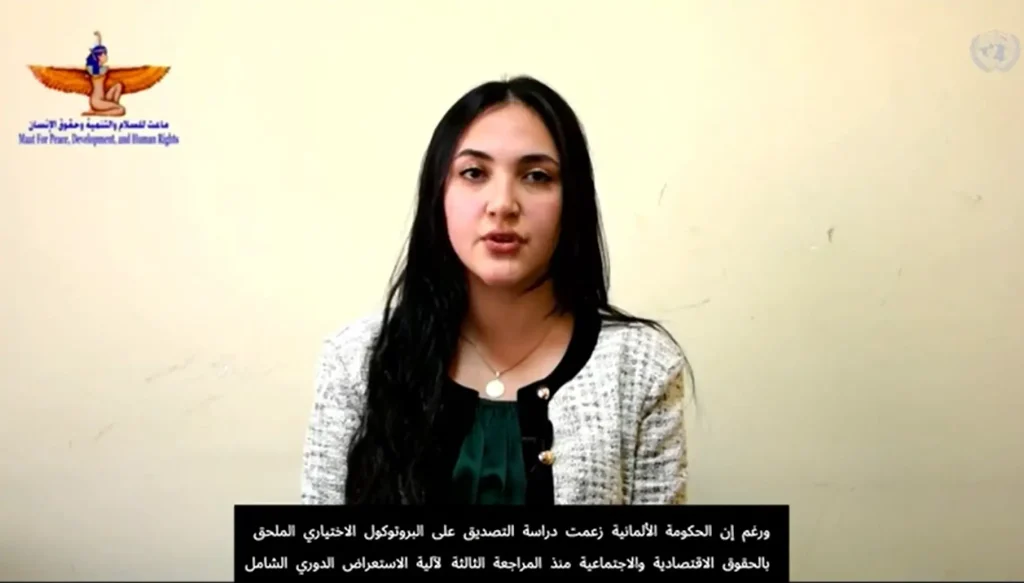From the United Nations headquarters in Geneva
Maat Organizes an Event on Human Rights Violations during Armed Conflicts
Friday, September 29, 2023 - Maat for Peace, Development, and Human Rights hosted a side event titled "Human Rights Violations in the Context of Sieges during Armed Conflicts” within the United Nations Palace in Geneva, on the sideline of the 54th session of the Human Rights Council. The symposium focused on two case studies: the situations in Yemen, particularly in the provinces of Taiz and Hodeidah, and in the Nagorno-Karabakh region.
During the event, speakers emphasized the deteriorating humanitarian situation in Al Hudaydah since its takeover by the Houthi militia. They highlighted how the planting of mines in the city has resulted in the internal displacement of over 30,000 families, effectively forcing them to leave due to the deliberate failure of the Houthi militia to remove the mines or provide mine maps to the United Nations mission. The speakers discussed a report titled "Hudaydah: A Booby-Trapped City," which outlined how the presence of mines hampers the movement of people and prevents humanitarian aid from reaching approximately 23,460 families. The report also highlighted the significant threat posed by sea mines to navigation in the Red Sea.
Furthermore, some speakers shed light on the grave violations of women's rights committed by the Zainabiyat Battalion in areas under the control of the Houthi militia. These violations include the persecution, surveillance, and punishment of women for exercising their basic rights, such as freedom of movement and freedom of expression. The speakers also noted that the Houthi militia has rejected all local and international initiatives to lift the siege on the city of Taiz. This has severely impacted the basic human rights of the city's residents, particularly in terms of economic and social rights, and has resulted in a deteriorating health condition and disrupted education for children.
At the outset of the event, Marina Sabri, Director of the International Mechanisms Unit at Maat, expressed concern regarding the development of the humanitarian situation in Nagorno-Karabakh. She confirmed that even before the recent escalations in the region, the 120,000 residents of Nagorno-Karabakh, including 30,000 children, were living in a state of emergency and enduring a permanent siege. The region faced daily power outages, fuel shortages, and a lack of other essential services. Sabri further emphasized that the complete blockade on the people of Artsakh, along with their long-term isolation from the outside world, aims to subjugate them through force. These circumstances have deepened the humanitarian crisis and led to the perpetration of violations that may amount to crimes against humanity.
In this context, Nasr Obaid, a human rights activist and member of the Peace Society for Combating Injustice and Persecution, highlighted the severe consequences of the war on the temporary capital, Aden, the worst impacted by war consequences. He emphasized that the governorate has experienced a collapse of infrastructure, including electricity, road networks, and water services. Additionally, economic and social rights, such as the right to education and healthcare, have deteriorated. Obaid appealed to the international community to take responsibility and alleviate the suffering of the Yemeni people.
Bassim Al-Janani reviewed a report titled "Hudaydah: A Booby-Trapped City," issued by the Southern Independent Group and the Rassd Foundation for Rights and Liberties. The report documented the violations suffered by the population of Hudaydah due to the siege imposed by the Houthi group. Al-Janani highlighted that during the truce period, the report documented 381 mine victims in Hudaydah, including 173 children. The planting of landmines has affected fishing and agriculture activities, turning large areas of the northwestern coast of Yemen into minefields. This has caused significant harm to the civilian population, particularly vulnerable groups such as women and children.
Ruqaya Al-Baiti, a human rights activist, addressed the Zainabiyat Battalion, a women's police agency operating in areas controlled by the Houthi militia. She explained that the Zainabiyat consists of women who ideologically align with the Houthi militia and carry out unlawful tasks. Al-Baiti described two wings of the Zainabiyat: one that uses violence, torture, smuggling, and forced subjugation of women, and another that employs lectures and advocacy methods to persuade women to adopt the militia's ideologies. The Zainabiyat monitors women's clothing, appearance, restricts their movement, conducts searches, arrests, home raids for preaching purposes, disrupts women's demonstrations and protests, and carries out spying and arrests. Al-Baiti mentioned that Intisar Al-Hammadi, a community activist currently imprisoned in militia prisons, is one of the victims of the Zainabiyat. Ultimately, the speakers unanimously condemned the grave human rights violations committed by the Houthi militia, which contradict international conventions and norms. They emphasized the severe harm caused by sieges on cities, particularly in terms of economic, social, and humanitarian aspects, and drew attention to the deliberate starvation policy implemented by the Houthi militia in Taiz by closing main ports and roads, which is a violation of international humanitarian law. The speakers called on the international community to acknowledge the facts and violations perpetrated by the Houthi militia in Yemen, which constitute crimes against humanity according to international law and humanitarian law.











